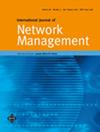SDOG: Scalable Scheduling of Flows Based on Dynamic Online Grouping in Industrial Time-Sensitive Networks
Abstract
Although many studies have conducted the traffic scheduling of time-sensitive networks, most focus on small-scale static scheduling for specific scenarios, which cannot cope with dynamic and rapid scheduling of time-triggered (TT) flows generated in scalable scenarios in the Industrial Internet of Things. In this paper, we propose a Scalable TT flow scheduling method based on Dynamic Online Grouping in industrial time-sensitive networks (SDOG). To achieve that, we establish an undirected weighted flow graph based on the conflict index between TT flows and divide available time into equally spaced time windows. We dynamically group the TT flows within each window locally. When the number of flows to be scheduled doubles, we can achieve scalable and efficient solutions to efficiently schedule dynamic TT flows, avoiding unnecessary conflicts during data communication. In addition, a topology pruning strategy is adopted to prune the network topology of each group, reducing unnecessary link variables and further effectively shortening the scheduling time. Experimental results validated our expected performance and demonstrated that our proposed SDOG scheduling method has advantages in terms of overall traffic schedulability and average time for scheduling individual traffic.

 求助内容:
求助内容: 应助结果提醒方式:
应助结果提醒方式:


